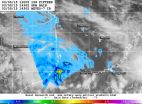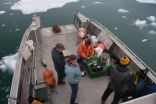INFORMATION:
The research was first published Feb. 14 online, and will appear in the March issue of the journal Evolutionary Applications.
Evolving to cope with climate change
New research measures the potential of important fish species to adapt to a more acidic ocean
2015-03-06
(Press-News.org) Over the next two centuries, climate change is likely to impact everything from industrial agriculture to the shape of our coastlines. The changing climate will certainly cause huge changes around the world, and the challenge is to predict exactly what impact those changes will have.
In the world of marine science, this means grappling with a process called ocean acidification. As human activity pumps carbon dioxide into the atmosphere, some of the carbon dioxide gets absorbed into the sea, which raises its acidity.
Scientists have been concerned about this for more than a decade, says Hannes Baumann, an assistant professor of marine sciences who studies the phenomenon in his lab at UConn's Avery Point campus. "The fundamental question," he says, "is whether or not organisms can adapt to this threat."
That question is important, because although ocean acidification is happening, it is a slow process. Levels of carbon dioxide in the atmosphere have increased more than 50 percent since the beginning of the Industrial Revolution. They are expected to undergo another four-fold increase, but over the course of the next 300 years.
"Three hundred years is only five or six generations for whales or long-lived sharks," says Baumann, "or 300,000 generations of single-celled organisms."
Recent work has thus focused on whether or not species can evolve along with the ocean, adapting over time to the increasing acidity.
Measuring evolutionary potential
In order to answer that question, Baumann and his colleagues turned to a small but important fish, the Atlantic silverside, Menidia menidia. Common across the shallow waters of eastern North America, the silverside is an important food source for aquatic birds like egret and cormorant, as well as commercially important fish species like bluefish and striped bass.
The researchers' goal was to measure the so-called "evolutionary potential" of this species. It was already known that high levels of carbon dioxide would kill many, but not all, Atlantic silverside larvae. The researchers wanted to know whether the likelihood of surviving had a genetic component: if fish that were related to one another were more or less likely to survive in the new environment.
"We were basically trying to answer the question: Can they evolve?" Baumann says.
His team approached the problem by capturing wild silverside from a beach in Long Island Sound, and raising several groups of their offspring in the lab, some under normal ocean conditions, and some in a more acidic environment.
They then tracked how long each of the fish lived, and analyzed their DNA, looking for what are called "microsatellites" - the same repetitive strands of DNA that are used in human paternity tests. The analysis revealed which fish were related to one another.
The team found that related fish had similar lifespans, suggesting that there is indeed a significant genetic component to survival in an acidic ocean. This means that the fish does have the potential to evolve, a finding which may have important ramifications for predictions about how the ocean environment will change with the changing climate.
Baumann, who recently joined the faculty at UConn after an appointment at Stony Brook University, was enthusiastic about the result, primarily because it demonstrates a method by which the evolutionary potential of other species can be measured.
"This is an experiment that can be performed in one generation," he says. He is hopeful that the results will prove useful in predicting how oysters, sea urchins, and a host of other marine organisms will be able to cope with the changing ocean environment.
ELSE PRESS RELEASES FROM THIS DATE:
'Habitable' planet GJ 581d previously dismissed as noise probably does exist
2015-03-06
The planet candidate was spotted using a spectrometer which measures the 'wobble', small changes in the wavelength of light emitted by a star, caused as a planet orbits it. In 2014 researchers revisiting the data said that the 'planet' was actually just noise in the data caused by starspots. The possible existence of the planet was widely dismissed without further questioning.
But now researchers from Queen Mary University of London (QMUL) and University of Hertfordshire have questioned the methods used to challenge the planet's existence. The statistical technique used ...
Gut bacteria may decrease weight loss from bariatric surgery
2015-03-06
LOS ANGELES (March 5, 2015) - The benefits of weight loss surgery, along with a treatment plan that includes exercise and dietary changes, are well documented. In addition to a significant decrease in body mass, many patients find their risk factors for heart disease are drastically lowered and blood sugar regulation is improved for those with Type 2 diabetes.
Some patients, however, do not experience the optimal weight loss from bariatric surgery. The presence of a specific methane gas-producing organism in the gastrointestinal tract may account for a decrease in optimal ...
NASA sees Mozambique Channel's new tropical storm
2015-03-06
Tropical Cyclone 15S formed in the Mozambique Channel of the Southern Indian Ocean, and the Global Precipitation Measurement or GPM core satellite gathered data on its rainfall rates.
The GPM (core satellite) flew over the northwestern half of newly formed Tropical Cyclone 15S on March 5 at 15:36 UTC (10:36 a.m. EST). The GPM satellite is managed by both NASA and the Japan Aerospace Exploration Agency known as JAXA.
GPM's Microwave Imager (GMI) instrument found that the heaviest precipitation was then occurring on the western side of the circulation center. Powerful ...
Melting glaciers create noisiest places in ocean, study says
2015-03-06
Bubbles gushing from melting glaciers and their icebergs make fjords the noisiest places in the oceans, a new study of waters near Alaska and Antarctica shows.
The underwater noise is much louder than previously thought, researchers found. That led them to ask how the noise affects the behavior of harbor seals and whales in Alaska's fjords.
"The ocean ambient sound gives us clues to the physical processes going on, but it also is an important aspect of the environment in which marine mammals and fish live. Like teenagers at a loud rock concert, the seals and whales modify ...
CU-Boulder researchers propose a novel mechanism to explain the region's high elevation
2015-03-06
No one really knows how the High Plains got so high. About 70 million years ago, eastern Colorado, southeastern Wyoming, western Kansas and western Nebraska were near sea level. Since then, the region has risen about 2 kilometers, leading to some head scratching at geology conferences.
Now researchers at the Cooperative Institute for Research in Environmental Sciences (CIRES) and the Department of Geological Sciences at the University of Colorado Boulder have proposed a new way to explain the uplift: Water trapped deep below Earth's crust may have flooded the lower ...
How rain is dependent on soil moisture
2015-03-06
This news release is available in German. The water content of soil has a great impact on the regional climate, but many of the connections are still not clear. Researchers at ETH Zurich's Institute for Atmospheric and Climate Science, together with colleagues from Belgium and the Netherlands, examined when and where it rains most frequently on summer afternoons. They wanted to clarify whether more rain fell on days when the soil was dry or moist. And where exactly it was most likely to rain on these days. The contradictory findings of other scientists was the reason ...
Calling your bluff: Supervisors easily sniff out what drives a worker
2015-03-06
Good supervisors aren't easily duped by the motives of underlings who go the extra mile - they know when an employee is sucking up to them because of personal ambition, or when such actions truly have what's best for the organization at heart. This is one of the insights from a study in Springer's Journal of Business and Psychology, led by Magda Donia of the University of Ottawa in Canada.
Supervisors play an important role in making decisions about rewards and promotions within an organization. They should therefore be able to effectively distinguish between so-called ...
Mars: The planet that lost an ocean's worth of water
2015-03-06
About four billion years ago, the young planet would have had enough water to cover its entire surface in a liquid layer about 140 metres deep, but it is more likely that the liquid would have pooled to form an ocean occupying almost half of Mars's northern hemisphere, and in some regions reaching depths greater than 1.6 kilometres.
"Our study provides a solid estimate of how much water Mars once had, by determining how much water was lost to space," said Geronimo Villanueva, a scientist working at NASA's Goddard Space Flight Center in Greenbelt, Maryland, USA, and lead ...
Ancient Mongol metallurgy an extreme polluter
2015-03-06
PITTSBURGH--The ancient Mongols have a reputation for having been fierce warriors. A new study out of the University of Pittsburgh shows them to have been unmatched polluters.
Graduate student Aubrey Hillman recently published a paper in the journal Environmental Science & Technology that shows copper and silver production in southwest China produced tremendous quantities of harmful heavy metals, such as lead, silver, zinc, and cadmium, starting in 1500 BC and continuing through the era of the Mongol Yuan Dynasty (1271-1368 AD). Hillman is near to earning her PhD from ...
Fluid-filled pores separate materials with fine precision
2015-03-06
(BOSTON and CAMBRIDGE) - In nature, pores can continuously control how a living organism absorbs or excretes fluids, vapors and solids in response to its environment; for example, tiny holes invisible to the naked eye called stomata cover a plant's leaves and stems as gated openings through which oxygen, carbon dioxide and water vapors are transported in and out during photosynthesis and respiration. And some scientists have proposed that micropores in the tissues of the air sacs of human lungs can open or close to modulate fluid flow based on changes in air pressure or ...
LAST 30 PRESS RELEASES:
Scientists show how to predict world’s deadly scorpion hotspots
ASU researchers to lead AAAS panel on water insecurity in the United States
ASU professor Anne Stone to present at AAAS Conference in Phoenix on ancient origins of modern disease
Proposals for exploring viruses and skin as the next experimental quantum frontiers share US$30,000 science award
ASU researchers showcase scalable tech solutions for older adults living alone with cognitive decline at AAAS 2026
Scientists identify smooth regional trends in fruit fly survival strategies
Antipathy toward snakes? Your parents likely talked you into that at an early age
Sylvester Cancer Tip Sheet for Feb. 2026
Online exposure to medical misinformation concentrated among older adults
Telehealth improves access to genetic services for adult survivors of childhood cancers
Outdated mortality benchmarks risk missing early signs of famine and delay recognizing mass starvation
Newly discovered bacterium converts carbon dioxide into chemicals using electricity
Flipping and reversing mini-proteins could improve disease treatment
Scientists reveal major hidden source of atmospheric nitrogen pollution in fragile lake basin
Biochar emerges as a powerful tool for soil carbon neutrality and climate mitigation
Tiny cell messengers show big promise for safer protein and gene delivery
AMS releases statement regarding the decision to rescind EPA’s 2009 Endangerment Finding
Parents’ alcohol and drug use influences their children’s consumption, research shows
Modular assembly of chiral nitrogen-bridged rings achieved by palladium-catalyzed diastereoselective and enantioselective cascade cyclization reactions
Promoting civic engagement
AMS Science Preview: Hurricane slowdown, school snow days
Deforestation in the Amazon raises the surface temperature by 3 °C during the dry season
Model more accurately maps the impact of frost on corn crops
How did humans develop sharp vision? Lab-grown retinas show likely answer
Sour grapes? Taste, experience of sour foods depends on individual consumer
At AAAS, professor Krystal Tsosie argues the future of science must be Indigenous-led
From the lab to the living room: Decoding Parkinson’s patients movements in the real world
Research advances in porous materials, as highlighted in the 2025 Nobel Prize in Chemistry
Sally C. Morton, executive vice president of ASU Knowledge Enterprise, presents a bold and practical framework for moving research from discovery to real-world impact
Biochemical parameters in patients with diabetic nephropathy versus individuals with diabetes alone, non-diabetic nephropathy, and healthy controls
[Press-News.org] Evolving to cope with climate changeNew research measures the potential of important fish species to adapt to a more acidic ocean


